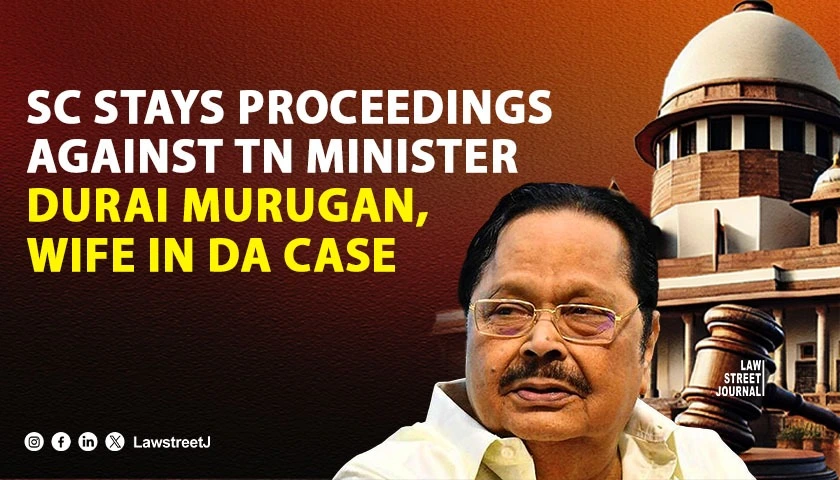NEW DELHI: The Supreme Court on Monday stayed the Madras High Court's order that set aside the discharge of Tamil Nadu Minister M Durai Murugan and his wife in a disproportionate assets case.
A bench of Justices Dipankar Datta and Augustine George Masih issued notice and sought a response from the state government on a special leave petition filed by the Minister and his wife, D Shanthakumari against the High Court's order of April 24, 2025.
The petitioners questioned the sanction having been obtained from the Speaker though it should have been sought from the Governor since at the time of the offence, Murugan was the Minister.
The petitioners also assailed the clubbing of their assets.
After hearing arguments of senior advocates Mukul Rohatgi and P Wilson the court issued notice and stayed further proceedings in the Trial court, and directed that the matter be tagged along with similar cases pending before the Supreme Court on the issue of sanction.
The prosecution alleged the petitioner and his wife amassed disproportionate assets of Rs 1,40,74,174 during the check period.
The petitioners contended the allegations against him pertained to a period when he was serving as Minister of the Government of Tamil Nadu. The prior sanction necessary to prosecute the petitioner ought to have been obtained from the Governor. However, the sanction has been obtained from the Speaker of the Legislative Assembly since the petitioner was an opposition MLA at the time of filing the final report.
The plea contended this issue of which is the competent authority to grant sanction when the accused was holding one office during the alleged commission of offence but was subsequently holding another office at the time of obtaining sanction is pending consideration of this court in a batch of cases.
It also stated the entire final report has been filed only on the basis of assets shown in IT returns of the two petitioners and clubbing their income. The Minister's wife was a business woman having a separate business and income, and is an income tax assessee for the past 33 years (from about 1980 onwards).
But for the clubbing of assets of the Minister and his wife, it would not be disproportionate to the known sources of income, their plea said.
The plea contended the clubbing of assets by the prosecution was illegal and contrary to the scheme of section 13 of the PC Act, 1988.
It also claimed the High Court has also not given any reason why it has set aside the finding of the Trial Court that the immovable properties of the wife were purchased out of her own income much prior to the check period.
When the sources of income for purchase of the assets in the name of A-1 and A-2 are borne out from the Income Tax returns, in the absence of any material filed by the prosecution, the charge of disproportionate assets against them is groundless, it said.
The High Court had allowed the revision petition filed by the state government to set aside the order of January 31, 2017 by the Special Judge/ Chief Judicial Magistrate, Vellore discharging him in the FIR lodged on November 23, 2011.
The FIR was lodged by the Deputy Superintendent of Police against the petitioners for offences allegedly under section 13(l)Ce) and 13(2) of the Prevention of Corruption Act, 1988. It was alleged that when the petitioner was serving as Minister, Government of Tamil Nadu between the period May 13, 2006 and May 14, 2011, he had been in possession of pecuniary resources and properties disproportionate to his known sources of income.
Disclaimer: This content is produced and published by LawStreet Journal Media for informational purposes only and does not constitute legal advice. The views expressed are independent of any legal practice of the individuals involved.

















